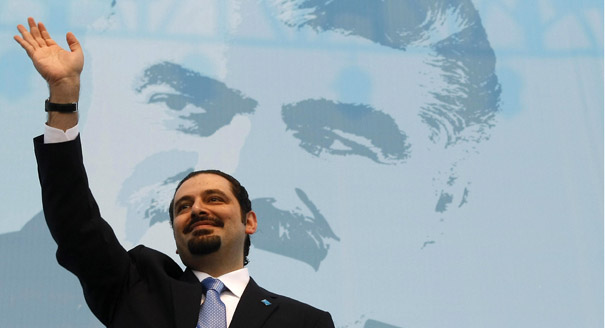The repercussions of Lebanese Prime Minister Saad al-Hariri’s recent resignation, then his freezing of that decision once in Beirut, continue to provoke debate. However, the prime minister’s understanding of his father’s political trajectory might help us better predict what he does next.
Much has been made of the fact that Hariri’s apparent sequestration in Riyadh a few weeks ago increased the prime minister’s popularity. The way Hariri was treated, the sheer humiliation of the form of his resignation, doubtless elicited a sentiment of solidarity with him at home. But things are unlikely to go much further than that. Hariri will continue to be judged according to his achievements and the reality is that even if many of his followers were disturbed by his treatment, their unease with his normalization with Hezbollah remains.
Then there is a more fundamental question that will catch up with the prime minister. What is his relationship with Saudi Arabia? It is one thing for his Lebanese supporters to resent Saudi highhandedness, but quite a different thing to accept that the preeminent Sunni representative in Lebanon has poor relations with the dominant Sunni Arab country. That is why the Saudi-Lebanese tensions were hardly reassuring to Hariri. The prime minister needs a regional sponsor, otherwise he stands little chance against a Hezbollah which benefits from both Iranian and Syrian backing. And the Lebanese, always well-versed in the ways of power, will be increasingly skeptical of a Hariri who is on his own regionally.
Hariri must be well aware of this, if only because Rafik al-Hariri, Saad’s father, embodied what it meant for a Lebanese leader to be bolstered by a major Arab country, and more importantly a regional consensus. The late prime minister came to power as the incarnation of a Saudi-Syrian agreement over Lebanon after the civil war in 1990. This gave him economic leeway in a country then under Syrian hegemony. But the compromise was undermined by two things.
First, by a Syrian effort to marginalize Hariri after 1998, when it ensured the election of army commander Emile Lahoud as president, thus altering the way Damascus had run Lebanon. By attempting to turn Lahoud into the main conduit for Syrian interaction with the Lebanese, and benefiting from his anchor in the army to act as a counterweight to the political class, the Syrians were effectively demoting Hariri, and with him the Saudi-Syrian understanding over Lebanon. Not surprisingly, this major shakeup in Syria’s system of control was managed by the impetuous Bashar al-Assad, who was then taking over from his dying father and had no real relationship with Hariri or the Saudis.
The second thing that undermined the Saudi-Syrian compromise was Hariri’s response to the Syrian moves against him, through the parliamentary elections of 2000. In a number of key constituencies, above all Beirut, Hariri won major victories, along with his political allies. As the late journalist Joseph Samaha would later remark, “It was too big a victory.” The Syrians felt threatened by Hariri’s gains, which would contribute greatly to their sustained efforts to intimidate him later on, ultimately ending with his assassination in 2005.
In the political context at the time, Rafik al-Hariri would feel increasingly vulnerable as his regional security blanket had been shredded. Hariri was relatively strong inside Lebanon, but that didn’t count for much if his power did not rest on a regional arrangement. His way of compensating was to reinforce his international ties, particularly with then-French president Jacques Chirac, and to try to loosen Syria’s grip on Lebanon, for example by quietly endorsing passage of United Nations Security Council Resolution 1559 in 2004. The resolution called for a withdrawal of all remaining foreign forces in Lebanon, meaning Syrian forces, and the disarmament of all Lebanese militias, which was directed principally against Hezbollah.
Once Hariri had done that, the foundations of his political career began collapsing. Both Iran and Syria saw in him a mortal danger to the order they had established. This they regarded as superseding any lingering agreement with Riyadh. And when Hariri seemed poised to challenge, and defeat, the Syrians and their allies in the parliamentary elections of 2005, all bets were off, and the consequences proved fatal for the former prime minster.
All this cannot but influence Saad al-Hariri. His implicit pact with Hezbollah, whereby he supported the election of its candidate Michel Aoun as president last year in exchange for being appointed prime minister, is a case in point. Hariri may have assumed for a time that he could impose this on the Saudis, but his resignation on November 9 suggested the contrary. For the prime minister, his willingness to come to terms with Hezbollah was perhaps an effort to put in motion a de facto Saudi-Iranian understanding over Lebanon. Today, such an ambition lies in shambles.
The prime minister must be wondering about his options. By opposing Hezbollah openly, he would neutralize the effectiveness of his own government, undermining his powers of patronage and increasing his security risks. By doing nothing, he would further alienate the Saudis, encouraging them to cut ties completely with him. This would leave him powerless, regardless of whether it earns him approval at home. Approval minus political sway is useless.
So now the race is on to find a formula that persuades the Saudis to pull back on their efforts to recruit Lebanon in their anti-Iran campaign. The Saudis may not have much regard for the Lebanese, but they are sensitive to the international refusal to see Lebanon dragged into the Saudis’ conflict with Tehran. However, for Saad al-Hariri the news is not reassuring. His first order of priority is to rebuild his relationship with Riyadh and acquire some leverage domestically. In his quieter moments he must dream of an Iranian-Saudi reconciliation. But for now the future is uncertain. His father must have faced similarly difficult moments.






